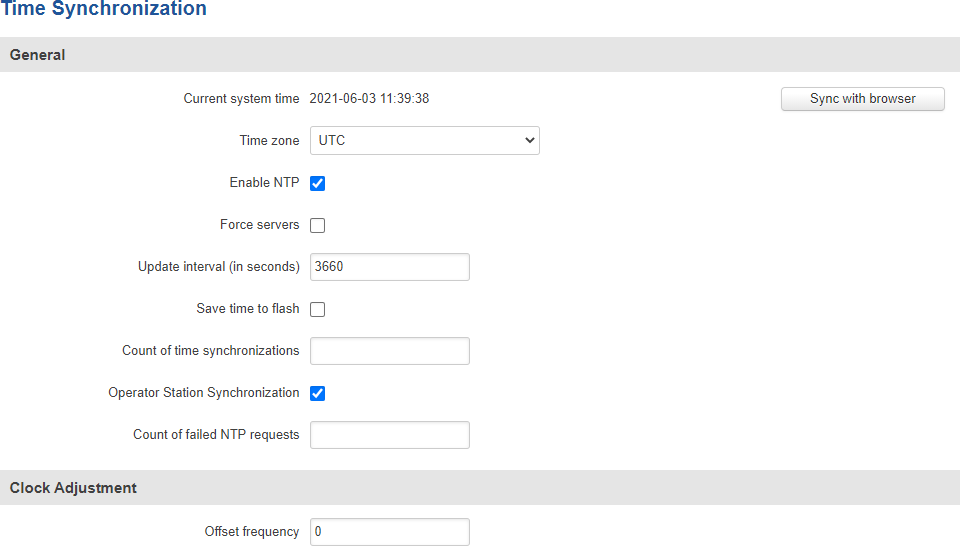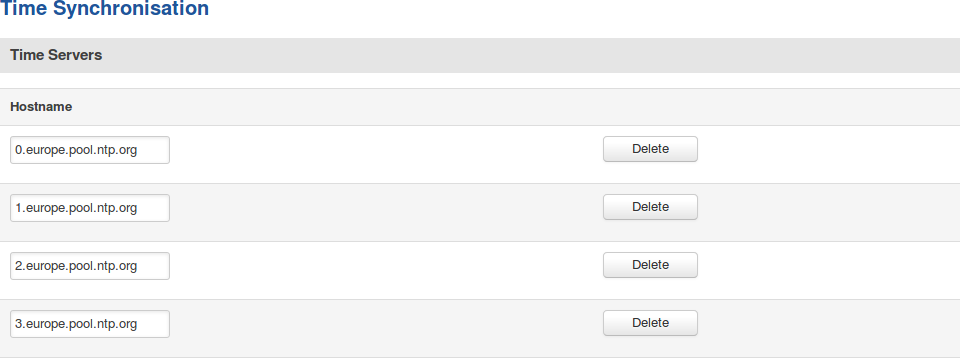RUT900 NTP (legacy WebUI): Difference between revisions
(Created page with "{{Template: Networking_rut_manual_ntp_legacy <!------------------------DEVICE-----------------------> | name = RUT900 | series = RUT9XX <!----------------------SEPARATORS---...") |
m (Dziugas moved page Draft:RUT900 NTP (legacy WebUI) to RUT900 NTP (legacy WebUI) without leaving a redirect) |
||
| (One intermediate revision by the same user not shown) | |||
| Line 4: | Line 4: | ||
| series = RUT9XX | | series = RUT9XX | ||
<!----------------------SEPARATORS---------------------> | <!----------------------SEPARATORS---------------------> | ||
| gps = | | gps = 0 | ||
}} | }} | ||
Latest revision as of 12:33, 19 July 2021
Main Page > EOL Products > RUT900 > RUT900 Manual > RUT900 Legacy WebUI > RUT900 Services section (legacy) > RUT900 NTP (legacy WebUI)The information in this page is updated in accordance with firmware version RUT9XX_R_00.06.09.5.
Note: this user manual page is for RUT900's old WebUI style available in earlier FW versions. Click here for information based on the latest FW version.
Summary
Network Time Protocol (NTP) is a networking protocol for clock synchronization between computer systems over packet-switched, variable-latency data networks.
This chapter of the user manual provides an overview of the NTP page for RUT900 devices.
General
The Time Synchronization section is used to configure general router time settings, like selecting the local time zone, setting a time update interval, synchronizing the time and more.
The figure below is an example of the Time Synchronization section and the table below provides information about the fields contained in that section.

| Field | Value | Description |
|---|---|---|
| Current system time | time; default: none | Current local time of the router. |
| Time zone | time zone; default: UTC | The router will sync time in accordance with the selected time zone. |
| Enable NTP | yes | no; default: yes | Turns NTP on or off. |
| Force servers | yes | no; default: no | Forces unreliable NTP servers. |
| Update interval (in seconds) | integer; default: 3660 | Defines how often the router will update the time. |
| Save time to flash | yes | no; default: no | Saves last synchronized time to flash memory. |
| Count of time synchronizations | integer; default: none | The amount of times that router will perform time synchronizations. Leave empty in order to set to infinite. |
| Operator Station Synchronizations | yes | no; default: no | Turns synchronization with mobile operator on or off. |
| Count of failed NTP requests | integer; default: none | The amount of times that router needs to fail to send NTP requests before launching operator station synchronization. Empty value - 5. |
| Offset frequency | integer; default: 0 | Adjusts the minor drift of the clock so that it will run more accurately. |
NTP Server
The router can also act as an NTP Server, providing clock synchronization to other devices in the network. From this section you can turn this feature on or off.
Time Servers
The Time Servers section displays the NTP servers that the router uses. You are provided with 4 default time servers (as seen in the example below), but you can also add custom time servers by clicking the 'Add' button or you can edit the given time servers.


